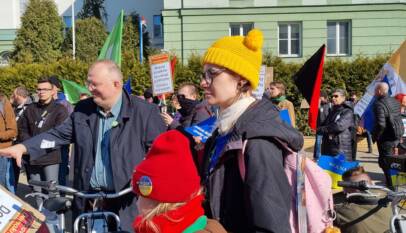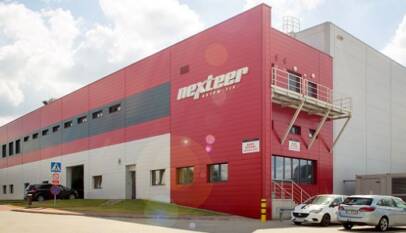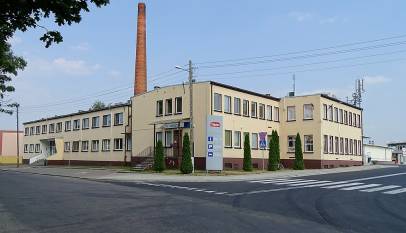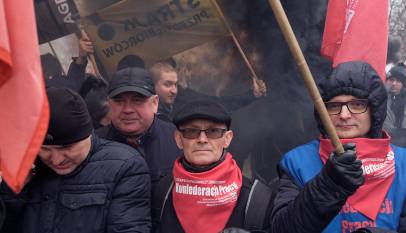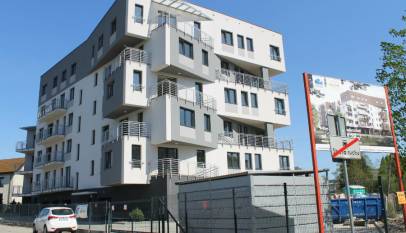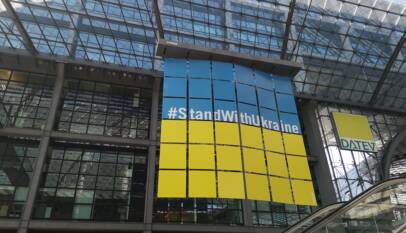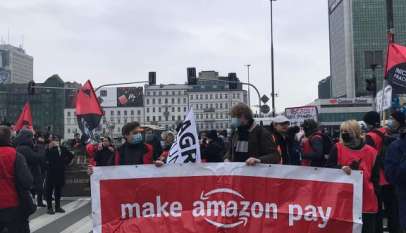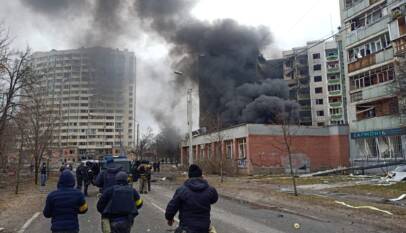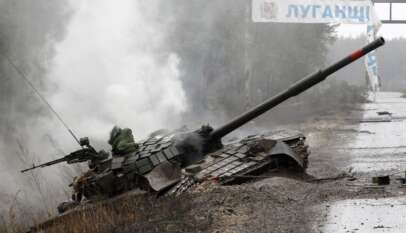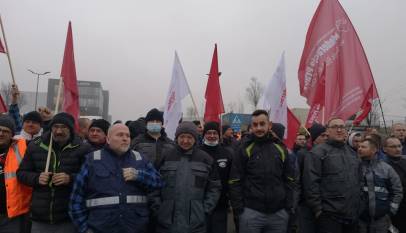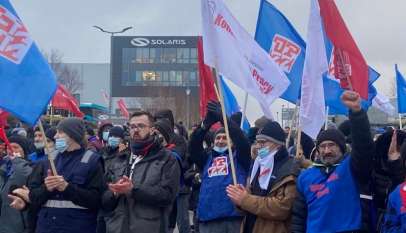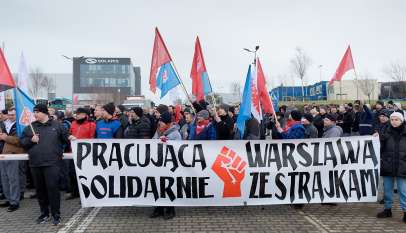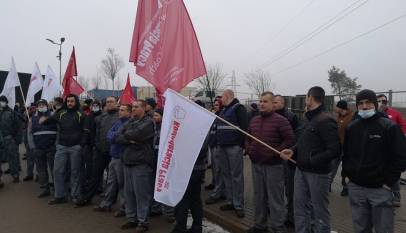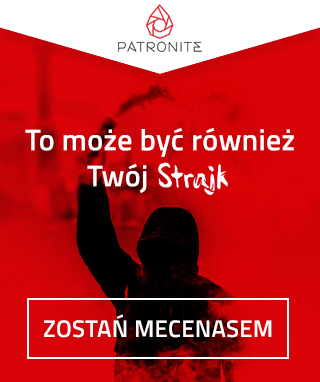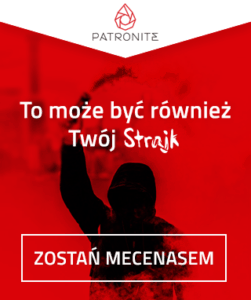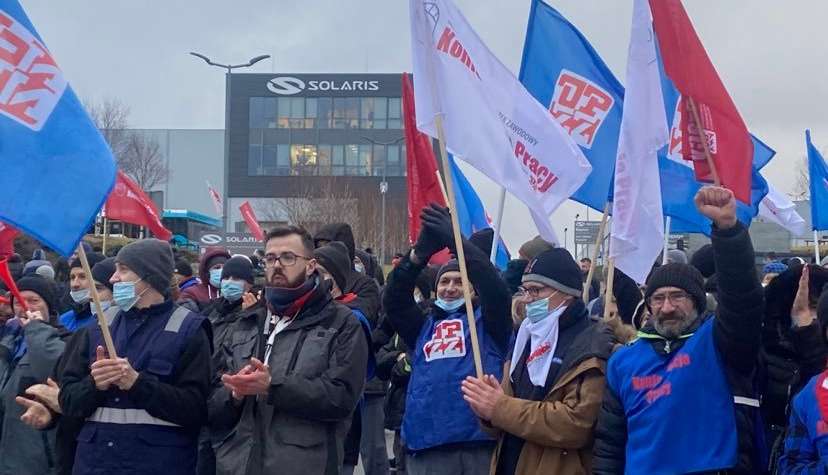
When they stood behind the factory barrier, with their flags, some serious, others happy and full of verve, it was as if the old images of the workers fighting came to life. For the core of the conflict is as old as the capitalist system. Solaris workers had been negotiating with the management for several months, they demanded pay rises but were ready to make some concessions. The employer wanted to give even less – so on 24 January they went on strike, and the strike goes on.
The factory and headquarters of Solaris Bus & Coach are located in Bolechowo. This is less than twenty kilometres north of Poznań’s Old Market Square. – Apart from this there is also a plant in Środa Wielkopolska, where vehicle frames are made, a plant in Kijewo outside Środa Wielkopolska, spare parts production in Swarzędz-Jasin, a service centre in Murowana Goślina and another small branch in Poznań, Wieruszowska street – explains Albert Wojtczak, chairman of NSZZ Solidarność in Solaris Bus. We talk outside of the factory at six o’clock in the morning. It is still dark around, a slight frost. On a normal working day the first shift would already be starting to assemble buses.
The 24th of January is no ordinary day. At six o’clock Wojciech Jasiński, chairman of the OPZZ Confederation of Labour structures in Solaris, enters the hall with a bold step. A siren sounds, but it is not a signal to work. General strike! It starts now and will continue until the company management gives in.
How many people joined it? Albert Wojtczak estimates cautiously: on this shift, in Bolechowo and elsewhere, about 70 percent. After 3 p.m., the second shift will come. They will also protest, the mood is militant. Wojciech Jasiński explains: ss far as production is concerned, over 90 per cent of the crew is out of work, production has stopped. – Those who do the hardest work, the most valuable work, and at the same time are paid the least, have stopped working. In short, the workers joined the strike.
And who does not take part? – Workers employed by external companies, foreigners, that’s about 200 people. There was also a clear suggestion from both trade unions that workers who have fixed-term contracts should not strike. At a meeting with the crew, we told them not to protest, because the company might take revenge on them and not renew their contracts – explains the trade unionist.
Later, at a press conference, trade unionists, together with MPs from the Left parliamentary club, repeat: the workers’ demands are not excessive. Solaris Bus & Coach has increased its profits, and it is the people on the production floor who have earned them. Since inflation is now eating away at their salaries, they have the right to demand pay rises.
We wanted an agreement
The strike is led by two union structures: NSZZ Solidarność and Konfederacja Pracy, part of OPZZ trade union federation. Two banners are hanging side by side on the plant fence, two flags are flying sometimes in a weak wind. And the two presidents of the trade union structures speak unanimously: we negotiated, we wanted to end this wage dispute through talks, we made concessions. We did not lack goodwill.
– At the very beginning, the employer offered a 150 PLN gross increase (around 30 euros) and 1 percent at the supervisor’s disposal. That is, he could have given one percent more to each employee or 2-3 people a larger amount. We did not agree to this. Our demand, only one, was: 800 PLN increase for each employee. To be exact, 400 PLN from October 2021, so as not to burden the company budget too much in 2022, and then from January 2022 another 400 – Albert Wojtczak summarises the course of the dispute and talks which began in September last year. – The employer did not accept this. Instead, he proposed 220 PLN for a subassembly worker, 300 PLN for electricians and welders, 470 PLN for foremen, 5 per cent for managers.
Neither the crew nor the unions representing them wanted different pay rises depending on the position. Pay rises in Solaris have always been equal for everyone, emphasise the activists, as everyone has his/her part in constructing buses. The employees wanted it to continue. Especially that they can calculate: with such a pay rise structure it is the managers who earn the most anyway would get the biggest share again.
Unions make a concession: PLN 600 pay rise, in two equal instalments. – In December, in January we were even ready to sign an agreement for PLN 400 for everyone, i.e. half of our expectations – says Wojciech Jasiński.
– The employer did not accept this either – Albert Wojtczak concludes the outline of the history of the dispute. – And then just before the strike referendum, at another meeting, we heard from the company that a pay rise would be implemented anyway. But not the one we asked for. The one that divided workers into groups, receiving from 270 to 470 PLN, plus 5 per cent for managers. We did not sign the agreement.
The strike referendum lasted a month. Over several weeks in December and January, over 52 per cent of the workforce voted. Almost each and every one of the more than 1,300 people who cast a ballot in the ballot box was in favour of the strike. In view of the employer’s earlier attitude, the protest demand is again: 800 PLN for everyone. What if the management proposes the 600 that they did not want to accept earlier? – We will talk about it – replies Jasiński.
So far, however, the board has not proposed anything. There was one meeting scheduled with the trade union leaders, then cancelled on the very last moment. Once, the president of Solaris, Javier Calleja, entered the hall where workers stay, not working, during their shifts. He apparently intended to talk to individual workers, but he was quickly encircled by angry crowd. One worker asked if it was OK to earn just some 4300 PLN (less than 1000 euros), his colleagues pointed out that their salaries were even smaller. Calleja left in hurry.
When workers walk around the plant, they see there are people in the management offices: the lights are on in the modern building. Those who sit behind the glass walls probably did not hear the choral „Greetings!” on the first strike day, but they must know what is going on.
The company has money
The company’s official statements of recent weeks speak of considerable sums, running into tens of millions, spent on pay rises in previous years. However, according to the trade unionists, the employees received another messages. The owners suggested, they say, that there would have been another pay rise. If it were not for the unions, which did not want to sign the agreement.
– The 400 zloty we asked for was absolutely compatible with 2022 planned company budget – said Wojciech Jasiński at an impromptu press conference at the barrier. – We are therefore all the more surprised that this proposal was not accepted. But we draw a conclusion: apparently the stalemate was not because of lack of money, because there is money, but about showing the employees their place. It was probably about preventing workers from raising their heads and asking for decent wages.
Solaris is a private company. A sign saying „Private property” and a security guard chasing away journalists who try to take pictures of the factory buildings clearly remind of this. A private owner can, if he wishes, raise workers’ wages. No trade union will prevent him from doing so.
In 2020, Solaris recorded a net profit of PLN 108.5 million, the highest ever. In 2018, Solaris was sold to Spanish transportations giant CAF. During the pandemic, the company’s management was gushing with optimism. Javier Calleja, predicted a stepping stone profit from the sale of electric buses, the percentage of which in Solaris’ production is steadily increasing. He also expected more European cities to ban cars in their city centres, which would mean increased demand for buses – that is, for the already known buses and new models from the factory near Poznań.
Thousands of buses
And yet in January a message went out to the workforce that it was the union leaders who were blocking the granting of „quick raises” – declares a Confederation of Labour activist. – Cynical, insolent lies! This is not how a social dialogue should look like – he says calmly, but firmly. That’s what a man says when he knows that he is expressing the voice of the crew that stands behind him.
At the moment, they stood even literally – the workers, after the rally in the hall ended, went to the gate, raised union flags, eager to pose for a group photo. Seeing this, even the security guard finally gave up and stopped shouting at media representatives not to take any pictures. The workers thank a group of people from the Young Left who came to express solidarity, carrying cardboard banners against exploitation and on the side of the workers. One of the young people, Adam Boch, tells me why it was important for them to come here: – We are also entering the labour market, we work as couriers, in gastro, in different professions. It’s in everyone’s interest to work under decent conditions, but at the moment wages are stagnating and the prices of everything are rising. For young people, for us, it’s important that this changes – that we don’t have Polish wages and German prices.
A bus with a „test drive” sign passes by the group several times. The front board alternately displays a name of a Spanish town and the words „Hanover systems”. Where will the vehicle end up? President Calleja was right. Solaris is an established brand and in January this year signed a contract to supply 183 e-buses to Oslo. The contract, won by tender, is worth 100 million euros. This is not the only such contract; according to the leader of the Confederation of Labour – the factory has already contracted 1400 new buses. I look up to the site of Solaris: the company boasts about new contracts in Estonia, Italy, Austria. Eighteen states altogether.
– During the pandemic the industry is in full swing, its results are great – sums up Piotr Ostrowski, Vice-President of OPZZ who came to Bolechów to support the strikers. That is why the employees are not afraid of suggestions, which were made by the management during previous negotiations: that if too much money goes to pay rises, then in a while some of the staff will have to be fired. After all, someone has to assemble the already contracted buses.
Support from the Left
On the 3rd of February, a solidarity demonstration in front of the factory was organised by activists from Inicjatywa Pracownicza and the Samba Warsaw Rumour team. Today the strikers were joined by Left Together MP Maciej Konieczny and New Left MP Katarzyna Ueberhan. The Left Together politician spoke to the workers on the shop floor. – I believe that you will persevere, I believe that you will win – he addressed the strikers. He also added that the whole of Poland is now looking at Solaris. – Workers all over the country are looking at you with hope that you will show that solidary, organised workers are able to fight effectively for decent wages, to fight for a fair division of profits made by their own hands – he announced. A storm of applause answered him.
Konieczny also asserted that the strike at Solaris is already well-known outside Poland. – All of Europe looks on in disbelief that the workers who produce these buses do not want to give a 200 euro pay rise! – he said.
In fact, the company’s management has not once in the last week expressed a willingness to meet with workers. Earlier it declared that it wanted to talk, but not about money. The intention to starve the protest – there is no pay for the time of the strike – seems quite clear.
Also on the 4th of February, the strikers received expressions of solidarity from other workers of the same CAF concern. Support for the Bolechów workers was expressed by those employed in CAF’s factories in Beasain and Irun in the Basque Country, who are members of the LAB sindikatua trade union. There come letters from German IG Metall, from IndustriALL. For everyone, it is logical, obvious even, that industrial workers demand a pay rise in view of inflation. For everyone, apart from Solaris management.
Management is not willing to negotiate
Andrzej Radzikowski, who is also currently chairman of the Social Dialogue Council, intended to take part in a meeting between the heads of the company’s trade unions (the Confederation of Labour and Solidarity) and Solaris president Javier Calleja. That such a meeting was planned was notified by the company on the 28th of January. The trade unionists were ready to talk.
However, the talks did not take place. Why not? The chairman refused to meet with Andrzej Radzikowski, hiding behind the state of the epidemic. When the chairman of the Social Dialogue Council nevertheless went to the plant’s gatehouse to ask about the president and the management board, he found out that… nobody was there
Gathered in front of the company barrier, the workers of the first shift enthusiastically welcomed Radzikowski, while the company management, which thus evades dialogue, was booed.
Andrzej Radzikowski and the president of the Confederation of Labour, Michał Lewandowski, reiterated that it is the workers who make the plant’s profits, so their demands to raise wages are not excessive. Those gathered at the site also referred to a press release from the company spokesman, which stated that less than a third of the workforce had gone on strike. – Liar, liar! – shouted the workers. To prove that the statements could not be further from truth, both trade unions present in the factory began recording and posting their daily assemblies online. So that everybody can see how first and second shift workers march around with their flags, chant the slogans – and do not intent to give up.
The Solaris workers’ strike fund can be supported here.
Translation into English: Wojciech Łobodziński.
How is the war in Ukraine changing Poland?
The Russian invasion of Ukraine is changing the whole world. Its consequences are felt by …


